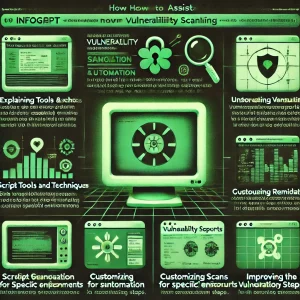ChatGPT- AI Ally Against Modern Threats.

Introduction
In today’s fast-paced cybersecurity world, keeping up with emerging threats and challenges can feel overwhelming. ChatGPT, an AI language model created by OpenAI, is here to help. Beyond just answering questions, ChatGPT assists cybersecurity professionals with everything from writing scripts to simulating attack scenarios. Here’s how ChatGPT is transforming cybersecurity, making life easier and more efficient for security experts everywhere.
1. Staying Updated on Threat Intelligence
Keeping up with the latest cybersecurity threats is critical, and ChatGPT makes it easy. It can break down complex concepts like zero-day exploits or social engineering, offering insights on recent vulnerabilities and attack methods. It’s like having a research assistant by your side, so you’re always a step ahead of potential threats.
2. Writing Scripts to Automate Tasks
Automating repetitive tasks can free up valuable time. ChatGPT helps by generating scripts in Python, Bash, PowerShell, and more. Whether you’re scanning networks or analyzing log data, ChatGPT provides ready-to-use code, helping you streamline your workflow without sacrificing accuracy.
3. Guidance for Vulnerability Scanning and Ethical Hacking
Ethical hacking requires both strategy and know-how. ChatGPT can guide you through vulnerability scanning tools like Nessus, Nmap, or OpenVAS. It provides step-by-step support, helping you understand scan results and possible exploits. While it’s no substitute for hands-on experience, ChatGPT offers a great foundation for understanding tools and techniques.
4. Reviewing Code for Security Gaps
Code vulnerabilities can pose serious security risks. ChatGPT helps you review code for common issues like SQL injection and cross-site scripting (XSS) and offers advice on secure coding best practices. If you’re developing security tools, ChatGPT can boost your code quality by identifying pitfalls and suggesting improvements.
5. Simulating Attack Scenarios
Understanding an attacker’s mindset is crucial in cybersecurity. ChatGPT can simulate hypothetical attack scenarios, showing how an exploit might unfold. This makes it easier for security teams to think critically, anticipate risks, and strengthen their defenses.
6. Learning and Upskilling in Cybersecurity
ChatGPT isn’t just for experts—it’s also a valuable learning tool. Whether you’re preparing for certifications like CompTIA Security+ or CEH or brushing up on fundamentals, ChatGPT provides easy-to-follow explanations, tips, and even mock scenarios to help you build your skills.
7. Supporting Incident Response and Forensic Analysis
In the event of a cyber incident, every second counts. ChatGPT guides you through the incident response process, from isolating affected systems to analyzing logs and finding indicators of compromise (IoCs). It’s a quick and reliable reference, making the response process smoother and more effective.
Limitations and Ethical Boundaries
As powerful as it is, ChatGPT has its limits. It doesn’t replace hands-on experience or real-world testing, nor does it support illegal or unethical hacking activities. ChatGPT’s role is to strengthen defenses and promote responsible cybersecurity practices.
ChatGPT can assist with vulnerability scanning in several ways.

1. Explaining Tools and Techniques:
- Example: If you’re using Nessus for vulnerability scanning, ChatGPT can explain how to set up a credentialed scan to get deeper insights into the target system. It can walk you through enabling specific plugins or configuring scan policies to target high-risk vulnerabilities.
2. Script Generation for Automation:
- Example: ChatGPT can generate a Python script that uses the Nessus API to automate scans, retrieve scan reports, and parse the results. You could, for instance, set up a script to run scans at specific intervals or alert you if critical vulnerabilities are detected.
3. Interpreting Vulnerability Reports:
- Example: After a scan, ChatGPT can help interpret complex scan results, explaining the severity levels and recommending steps to address high or critical vulnerabilities. For example, ChatGPT could break down a report to clarify why a specific CVE (Common Vulnerabilities and Exposures) is critical and suggest patching steps or mitigation measures.
4. Customizing Scans for Specific Environments:
- Example: If your environment has particular compliance requirements, ChatGPT can guide you in customizing scans to focus on vulnerabilities relevant to standards like PCI-DSS or HIPAA. It can recommend specific plugins or settings to tailor your scans to these standards.
5. Suggesting Remediation Steps:
- Example: Based on the vulnerabilities found, ChatGPT can provide remediation guidance, such as applying patches, hardening configurations, or isolating vulnerable services. For instance, if a scan detects an outdated version of OpenSSL, ChatGPT can outline steps to upgrade and configure it securely.
6. Improving the Vulnerability Scanning Workflow:
- Example: ChatGPT can help improve your scanning processes by suggesting ways to organize, prioritize, and document findings, automate repetitive tasks, and integrate scanning into CI/CD pipelines if you’re in a DevOps environment.
ChatGPT, paired with vulnerability scanners, can streamline understanding, implementation, and remediation for better vulnerability management and overall security posture.
Conclusion
ChatGPT is redefining how cybersecurity professionals work, turning complex tasks into manageable ones. From automating tasks to supporting education and response efforts, ChatGPT is a valuable partner in your cybersecurity journey. Whether you’re a seasoned pro or just starting, ChatGPT is here to help you tackle cybersecurity challenges head-on.
No comments